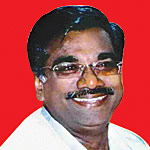A nice place to spend your evening in Pondicherry is the promenade of its beach. You can stroll from one end to the other within fifteen minutes. The waves of the sea will bring back to your memory if you know the history of Pondicherry, a hundred stories from its buried past. On the promenade you will come across people from many nations, Pondicherry being a cosmopolitan city.
During your stroll, you are bound to come across invalids stretching out their hands before you and ask for your help. They want your help not to live in comfort but to please the greatest of all gods living in everyone’s stomach.
Some look at these needy people with mischievous smile. Some sneer at them. Some shoo them away. Some howl at them. Some preach sermons to them on the necessity of making a living without begging. Some push their hands into their trouser pocket and fish for coins, only to tease them. Some confess by saying, “If today’s situation continues, then I may have to join you tomorrow”. Some declare that they have no change and behave as if their purses were packed with two thousand rupee currency notes. Some pity them and that is all they can afford. Some magnanimously part with a one or two rupee coin. A real struggle for the needy to bag that coin.
A Tamil proverb reads: Maram vatchavan thanni ootthuvan, which in translation would read: “He who plants a tree will definitely water it”. Once an invalid is created, then he becomes the creator’s concern. We are all invalids in one way or the other. The Holy Koran says that God writes on every grain he creates, the name of its taker. Very true! Rice cooked for lunch not only gets into the bellies of family members but also into dogs, cats, and birds. Flies too have their share of food. How often do we watch ants carry away rice spilled out of our plate!
Many share what one buys. The Lord provides money to the buyer with the great hope that he would share it with the other needy. The Lord has His own ways of providing food for every one of His creations. The toad inside a stone too gets its food.
Katha Upanishad tells the story of a pious man who offered food to someone every day before he ate his lunch. One day he went around the village in search of a hungry man because none had turned up. He managed to find one and took him home.
“It’s my custom to sing of the glory of the Lord before I eat. So sing with me,” said the pious man to the hungry man.
“Sing of the Lord? How can I sing of someone whom I have never seen in my life! I have no faith in Him,” said the hungry atheist. He then added, “Since you are giving me food, I will sing in praise of you, for you are my Lord now”.
“I am sorry I can’t give you food unless you sing with me of the Lord,” said the pious man.
“Hei! Shut up! Did I ever ask you for food? It was you who invited me to your house. It was you who promised to give me food. Now you are insulting me. I would rather go hungry than sing of your so-called Lord,” so saying the hungry man left the place.
That day the pious man ate his lunch without sharing it with others. That night the Lord appeared in his dream. “I gave you enough wealth to feed at least one hungry mouth every day. It was a real struggle for me yesterday to provide food to that critic of mine,” said the Lord and disappeared.
It took little time for the pious man to realise that the Lord doesn’t distinguish between the theist and the atheist. In His eyes, all are one and he entrusts everyone with the task of providing food for others so that none of his subjects go hungry.
“To those who give all is given,” says the Bible. Instead of looking down upon the needy, let us extend our helping hand, for every single good deed that we do, a hundred good things are offered to us. For every evil action of ours, we will be pinned down with a thousand more evil deeds.
Escaping from prison, Jean Val Jean, the hero of Victor Hugo’s immortal classic Les Miserables, goes to a Bishop’s house. There he has well looked after. He is fed and given a good bed to sleep in. This show of love is too much for Jean Val Jean. He opens his heart to the Bishop. The reply is, “This is not my house. It is the house of Christ. You are suffering. You are cold. You are hungry and thirsty. It is Christ who welcomes you, not I”.
Well! Everyone to his faith. Even if we have nothing to offer to the one that begs for help, a word of consolation too would help.























